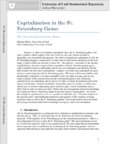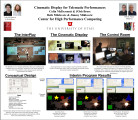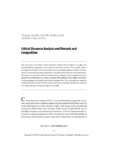|
|
Creator | Title | Description | Subject | Date |
| 26 |
 |
Thalos, Mariam G. | Capitalization in the St. Petersburg Game: why statistical distributions matter | In spite of its infinite expectation value, the St. Petersburg game is not only a gamble without supply in the real world, but also one without demand at apparently very reasonable asking prices. We offer a rationalizing explanation of why the St. Petersburg bargain is unattractive on both sides (to... | | 2013-01-01 |
| 27 |
 |
Battin, Margaret P. | Case comment: the case of Nicole: suicide and terminal illness | What shall one say about Nicole? My immediate answer is an easy one-liner: if there ever were a case in which a choice of suicide appears both rational and rationally made, this seems to be it. | | 1933 |
| 28 |
 |
Battin, Margaret P. | Cases for kids: using puzzles to teach aesthetics to children | Nothing stupefies kids (I have in mind young people, though the same is true of many adults) as quickly as long-winded, jargon-filled, highly abstract theoretical discourse, especially when it seems to have no immediate utility. Kids like fun. They like play; they like games; they like challenges an... | Aesthetics; Education; Children; Puzzles | 1994 |
| 29 |
 |
Miklavcic, Jimmy; McDermott, Colin Hull; Bross, Joshua Lee; Miklavcic, Elizabeth Ann | Cinematic display for telematic performances | The InterPlay is a live telematic performance that occurs simultaneously in multiple sites across the globe, streamed over the internet through the Access Grid videoconference system, then processed, mixed and projected before an audience. | Trapeze Interactive Poster | 2010-01-13 |
| 30 |
 |
Haber, Matthew | Coherence, consistency, and cohesion: Clade selection in Okasha and beyond | Samir Okasha argues that clade selection is an incoherent concept, because the relation that constitutes clades is such that it renders parent-offspring (reproduction) relations between clades impossible. He reasons that since clades cannot reproduce, it is not coherent to speak of natural selection... | Biological classification; Cladistics; Taxonomy | 2005-12 |
| 31 |
 |
Tuttle, Howard N. | Comment on Professor Jordan's paper | In these remarks I would like to elaborate what I understand to be the thrust of Professor Jordan's paper, and to introduce and relate to his work a notion of lived experience, which is suggested to me by his material throughout. Professor Jordan claims that the phenomena investigated by the moral ... | Moral science; Moral scientists; Professor Jordan | 1976 |
| 32 |
 |
Thalos, Mariam G. | Common need for classical epistemological foundations: against a feminist alternative | The difficulties of justifying a recipe for scientific inquiry that calls for sensory experience and logic as sole ingredients can hardly be overestimated. Resolving the riddles of induction, steadily mounting against empiricism since Hume, has come to seem like an exercise in making bricks without... | Epistomology; Feminism; Sensory experience; Logic; Inductive inference | 1994 |
| 33 |
 |
Andreou, Chrisoula | Communicative Action and Rational Choice by Joseph Heath [review] | A review of Communicative Action and Rational Choice, in which the author, Joseph Heath, develops an insightful account of practical reason that builds on his critical evaluations of both Jurgen Habermas's theory of communicative action and the instrumental conception of rationality. | Action; Communication; Rationality; Choice; Book review | 2002 |
| 34 |
 |
Francis, Leslie | Competitive sports, disability, and problems of justice in sports | A "level playing field" is a stock metaphor for equality. Despite its status as a near-cliché, however, the metaphor has been given limited theoretical attention. Deliberately tilting the field so that one set of contestants must consistently run uphill while their opponents get a downhill ride is... | Level playing field; Competitive sports | 2005 |
| 35 |
 |
Nichols, Shaun | Confabulation, confidence, and introspection | Carruthers' arguments depend on a tenuous interpretation of cases from the confabulation literature. Specifically, Carruthers maintains that cases of confabulation are "subjectively indistinguishable" from cases of alleged introspection. However, in typical cases of confabulation, the self-attributi... | Confabulation; Carruthers | 2009-04 |
| 36 |
 |
Landesman, Bruce M. | Confidentiality and the lawyer-client relationship | The Model Rules of Professional Conduct proposed by the American Bar Association differ from the presently enforced Code of Professional Responsibility in a number of ways. This essay focuses on the differences with regard to the scope and limits of confidentiality in the lawyer-client relationship. | Professional Conduct; Confidentiality; Professional Responsibility | 2006-06-16 |
| 37 |
 |
White, Nicholas P. | Conflicting parts of happiness in Aristole's Ethics | Examines the concept of happiness based on Aristotle's view of ethics. Linkage between issues of ethics and altruism; Comparison between Kantian View and Hegelian View about the existence of a genuine dualism; Inclusivism as a common element in Aristotle's ethics; Conflicting parts of happiness. | Criticism; Happiness, moral & ethical aspects | 2001-09-17 |
| 38 |
 |
Battin, Margaret P. | Continuous sedation until death: moral justifications of physicians and nurses─a content analysis of opinion pieces | Continuous Sedation until Death (CSD), the act of reducing or removing the consciousness of an incurably ill patient until death, often provokes medical-ethical discussions in the opinion sections of medical and nursing journals. A content analysis of opinion pieces in medical and nursing literature... | | 2012-01-01 |
| 39 |
 |
Battin, Margaret P. | Contributions of aesthetics | The most tempting answer to the question posed as the topic for these remarks -- "what can aesthetics contribute to a young person's ability to understand and value art?" -- is "nothing", or, at least, "embarrassingly little". Aesthetics, after all, is a field of philosophy, and hence a field dedi... | | 1988 |
| 40 |
 |
Battin, Margaret P. | Coping with methuselah the impact of molecular biology on medicine and society | The prospect of extra-long life spawns a bloom of ethical issues, among them how to achieve intergenerational equity; how to balance health care entitlements with rising costs for the elderly; how to divide years of life between work and retirement; how to assign the responsibilities of young family... | | 2004 |
| 41 |
 |
Francis, Leslie | Creation Ethics and the harms of existence | David DeGrazia's Creation Ethics1 is a fascinating effort to present a consistent account of creation in many contexts-from reproduction, to self-creation through genetic enhancement, to the creation of entire future generations. For reasons of space, this comment addresses the related discussions o... | | 2014-01-01 |
| 42 |
 |
Andrus, Jennifer | Critical discourse analysis and rhetoric and composition | Over the past two decades, critical discourse analysis has emerged as a major new multidisciplinary approach to the study of texts and contexts in the public sphere. Developed in Europe, CDA has lately become increasingly popular in North America, where it is proving especially congenial to new dire... | | 2012-01-01 |
| 43 |
 |
Kukathas, Chandran | Cultural contradictions of socialism | While no one has yet announced the death of capitalism, reports of its imminent demise have been as numerous as they have been exaggerated. Such reports have usually been bolstered by thoughtful analyses of the fundamental contradictions of capitalism, which was expected to come sliding-if not crash... | Economic systems; Social organization | 2002-11-22 |
| 44 |
 |
Battin, Margaret P. | Death ethics: religious and cultural values in prolonging and ending life | In this sequel to his earlier Birth Ethics, Kenneth Vaux again uses what he calls a 'multiphasic ethical scheme," incorporating naturalistic, humanistic, and theistic values to explore the issues of suicide, euthanasia, letting die, genocide, withdrawing life supports, and other end-of-life issues. | | 1994 |
| 45 |
 |
Battin, Margaret P. | Death ethics: religious and cultural values in prolonging and ending life (book review) | A review of the book "Death Ethics: Religious and Cultural Values in Prolonging and Ending Life" by Kenneth L. Vaux. | Books; Life; End of life | 1994-07 |
| 46 |
 |
Landesman, Bruce M. | Decent society (book review) | Review of the book `The Decent Society,' by Avishai Margalit. | Books; Philosophy | 1997-07 |
| 47 |
 |
Chatterjee, Deen | Democracy beyond borders: justice and representation in global institutions | A book review of Andrew Kuper's Democracy Beyond Borders: Justice and Representation in Global Institutions. | Book review; Democracy; Global governance | 2006-04 |
| 48 |
 |
Goldberg, Robert A. | Denver: Queen City of the Colorado realm | In the spring of 1921, William Joseph Simmons stepped from a train at Denver's Union Station. Dressed in a well-fitted suit emblazoned with lodge buttons, this tall, heavy-set man attracted little notice from the crowd. Few Denverites realized that on the train platform stood the self-proclaimed Imp... | | 1991 |
| 49 |
 |
Newman, Lex | Descartes on unknown faculties and our knowledge of the external world | Descartes introduces his skeptical arguments, in the First Meditation, in an order of increasing strength. First, the narrator-meditator notices that judgments concerning the nature of small and distant objects are unreliable; later, that even sensory judgments about large and close objects are in d... | Corporeal existence; Skeptical argument | 1994 |
| 50 |
 |
Newman, Lex | Descartes' epistemology | René Descartes (1596-1650) is widely regarded as the father of modern Philosophy;. His noteworthy contributions extend to mathematics and physics. This entry focuses on his philosophical contributions in the theory of knowledge. Specifically, the focus is on the epistemological project of Descartes... | Descartes; Philosophy;; Epistemology | 2005-04-14 |

























